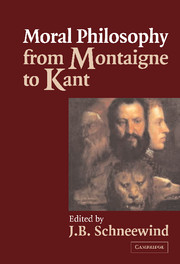Book contents
- Frontmatter
- Contents
- Preface
- Acknowledgments
- Foreword to the One-Volume Reprint
- Introduction
- PROLEGOMENA: SOME QUESTIONS RAISED
- PART I REWORKING NATURAL LAW
- Francisco Suarez
- Hugo Grotius
- Thomas Hobbes
- Richard Cumberland
- Samuel Pufendorf
- John Locke
- PART II INTELLECT AND MORALITY
- PART III EPICUREANS AND EGOISTS
- PART IV AUTONOMY AND RESPONSIBILITY
- Supplemental Bibliography
Hugo Grotius
Published online by Cambridge University Press: 05 June 2012
- Frontmatter
- Contents
- Preface
- Acknowledgments
- Foreword to the One-Volume Reprint
- Introduction
- PROLEGOMENA: SOME QUESTIONS RAISED
- PART I REWORKING NATURAL LAW
- Francisco Suarez
- Hugo Grotius
- Thomas Hobbes
- Richard Cumberland
- Samuel Pufendorf
- John Locke
- PART II INTELLECT AND MORALITY
- PART III EPICUREANS AND EGOISTS
- PART IV AUTONOMY AND RESPONSIBILITY
- Supplemental Bibliography
Summary
Introduction
In 1788 Thomas Reid praised the “immortal Hugo Grotius” as the author of the first noteworthy attempt to systematize the commonsense morality of the human race with the aid of the civil law's technical apparatus. Eighty years earlier Jean Barbeyrac, who translated Grotius's main work into French, claimed that Grotius was the “first who broke the ice” in the modern history of the “science of morality.” It was Grotius who left behind the sterile debates of the Aristotelian scholastics and opened the way for the modern development of moral philosophy, and it was Grotius's position, Barbeyrac added, and not that of the brilliant but dangerous Hobbes, that was continued by Pufendorf and Locke. Nineteenth- and twentieth-century surveys of the history of moral philosophy do not give Grotius so important a place, but if we wish to see the subject as it looked in early modern Europe, we cannot ignore him.
Hugo Grotius was born in the Netherlands in 1583. A brilliant and precocious scholar, he was part of a diplomatic mission to France when he was only fifteen. He practiced law, held several high public offices, and wrote Latin dramas as well as treatises on maritime law and a history of his country. Much against his will Grotius became involved in the fierce religious controversies then dividing the Protestants of Holland, which were connected with continuing struggles for political power. As a result he was sentenced in 1619 to life imprisonment.
- Type
- Chapter
- Information
- Moral Philosophy from Montaigne to Kant , pp. 88 - 110Publisher: Cambridge University PressPrint publication year: 2002

